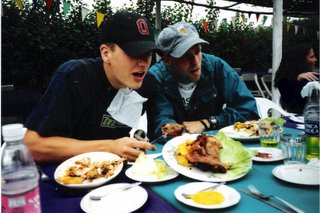28 "There is a mine for silver
and a place where gold is refined.
2 Iron is taken from the earth,
and copper is smelted from ore.
3 Man puts an end to the darkness;
he searches the farthest recesses
for ore in the blackest darkness.
4 Far from where people dwell he cuts a shaft,
in places forgotten by the foot of man;
far from men he dangles and sways.
5 The earth, from which food comes,
is transformed below as by fire;
6 sapphires come from its rocks,
and its dust contains nuggets of gold.
7 No bird of prey knows that hidden path,
no falcon's eye has seen it.
8 Proud beasts do not set foot on it,
and no lion prowls there.
9 Man's hand assaults the flinty rock
and lays bare the roots of the mountains.
10 He tunnels through the rock;
his eyes see all its treasures.
11 He searches the sources of the rivers
and brings hidden things to light.
12 "But where can wisdom be found?
These words are stunning and beautiful. If I were a miner, I'd write them on my hat, perhaps on my tombstone. The passage ends with an assertion:
23 God understands the way to it
and he alone knows where it dwells,
24 for he views the ends of the earth
and sees everything under the heavens.
25 When he established the force of the wind
and measured out the waters,
26 when he made a decree for the rain
and a path for the thunderstorm,
27 then he looked at wisdom and appraised it;
he confirmed it and tested it.
28 And he said to man,
'The fear of the Lord--that is wisdom,
and to shun evil is understanding.'"
That last verse is the ringer--it ties Job to the entirety of the Torah. Somewhere in evangelicalism, we have lost a bit of the fear of the Lord. Sure, we shun evil, but we miss out on the fear thing. We spend our effort explaining how we don't really have to fear Him, how he loves us and we just need to respect him. But that's not entirely true. I'm excited about Narnia coming out in theaters because it will give us a good way to talk about this--it's no coincidence that Lewis used a lion to represent Jesus, and there's more than the lion of Judah going on. Aslan is kind. Aslan is good. And yet, Aslan is fierce. He is not to be trifled with.
That's what I love about this other passage. I don't mean this in a morbid way (previous posts aside), but someday I hope that the epithet Nehemiah gives Hananiah will be true of me--even placed on my tombstone:
7 After the wall had been rebuilt and I had set the doors in place, the gatekeepers and the singers and the Levites were appointed. 2 I put in charge of Jerusalem my brother Hanani, along with Hananiah the commander of the citadel, because he was a man of integrity and feared God more than most men do.


